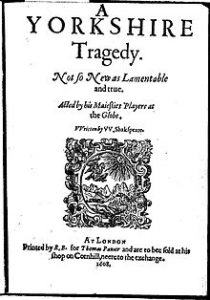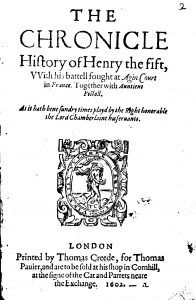The next entry in the register relating to Shakespeare is dated 2 May 1608, and records Thomas Pavier’s registration of ‘A book called A Yorkshire Tragedy, written by Wylliam Shakespere’. The play’s title page again links an apocryphal play to both Shakespeare and his company: ‘Acted by his Majesties Players at the Globe. Written by W. Shakspeare’.
 Katherine Duncan-Jones is unusual among Shakespeare scholars in claiming that the play is indeed by Shakespeare. She is particularly taken with the fact that the phrase ‘marble-hearted’ appears in both this and King Lear. However, though Duncan-Jones found Shakespeare the only writer to use this phrase according to a search of the Chadwyck Healey LION database, a search of the more comprehensive EEBO (Early English Books Online) database reveals it was used earlier by poet Francis Davison in 1602, appeared in the essays of Michel Montaigne (a recognised influence on Shakespeare), and was subsequently widely employed. Though both Thomas Heywood and George Wilkins have been suggested as authors of the play, the current critical consensus is that the play was by Thomas Middleton.
Katherine Duncan-Jones is unusual among Shakespeare scholars in claiming that the play is indeed by Shakespeare. She is particularly taken with the fact that the phrase ‘marble-hearted’ appears in both this and King Lear. However, though Duncan-Jones found Shakespeare the only writer to use this phrase according to a search of the Chadwyck Healey LION database, a search of the more comprehensive EEBO (Early English Books Online) database reveals it was used earlier by poet Francis Davison in 1602, appeared in the essays of Michel Montaigne (a recognised influence on Shakespeare), and was subsequently widely employed. Though both Thomas Heywood and George Wilkins have been suggested as authors of the play, the current critical consensus is that the play was by Thomas Middleton.
 The publisher of A Yorkshire Tragedy, Thomas Pavier, has been much maligned over the last century for his involvement in the publication of what is known as as The False Folio. Recent scholarship, however, suggests that his behaviour can easily be explained as an assertion of his existing publication rights, and was was not the act of piracy that has been portrayed. In fact a detailed study of Pavier by Gerald Johnson demonstrates that he was a reputable publisher, who would not knowingly have risked his reputation by an act of piracy.[1] Pavier had published a genuine Shakespeare play — the third edition of Henry V — in 1602. This 1602 quarto was openly associated with Shakespeare’s company — ‘As it hath been sundry times played by the Right honourable the Lord Chamberlain his servants’ — but had no author’s name attached. If attaching the name ‘Shakespeare’ to A Yorkshire Tragedy had a profit motive, why would Pavier not have attached that name to Henry V? And is it really likely that Pavier would deliberately offend the source of plays that were profitable to him by taking that person’s name in vain? Is it not a more reasonable explanation that A Yorkshire Tragedy was sold to Pavier as being by William Shakespeare, and that the most reasonable source of his manuscript was the company itself?
The publisher of A Yorkshire Tragedy, Thomas Pavier, has been much maligned over the last century for his involvement in the publication of what is known as as The False Folio. Recent scholarship, however, suggests that his behaviour can easily be explained as an assertion of his existing publication rights, and was was not the act of piracy that has been portrayed. In fact a detailed study of Pavier by Gerald Johnson demonstrates that he was a reputable publisher, who would not knowingly have risked his reputation by an act of piracy.[1] Pavier had published a genuine Shakespeare play — the third edition of Henry V — in 1602. This 1602 quarto was openly associated with Shakespeare’s company — ‘As it hath been sundry times played by the Right honourable the Lord Chamberlain his servants’ — but had no author’s name attached. If attaching the name ‘Shakespeare’ to A Yorkshire Tragedy had a profit motive, why would Pavier not have attached that name to Henry V? And is it really likely that Pavier would deliberately offend the source of plays that were profitable to him by taking that person’s name in vain? Is it not a more reasonable explanation that A Yorkshire Tragedy was sold to Pavier as being by William Shakespeare, and that the most reasonable source of his manuscript was the company itself?
[1] Gerald D. Johnson, ‘Thomas Pavier, Publisher 1600-1625’, The Library, 6th Series, 14 (1992): 12-48
Click Here to Subscribe and we’ll notify you about new content.